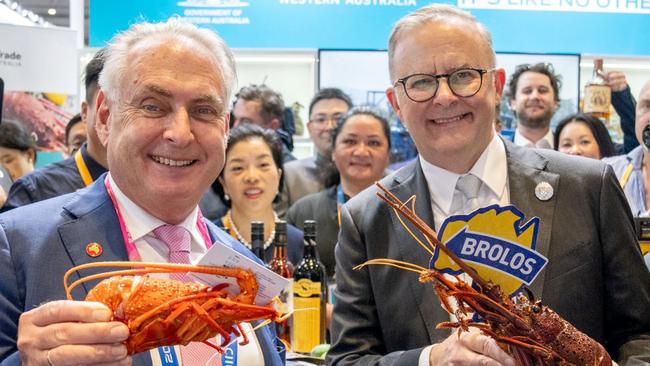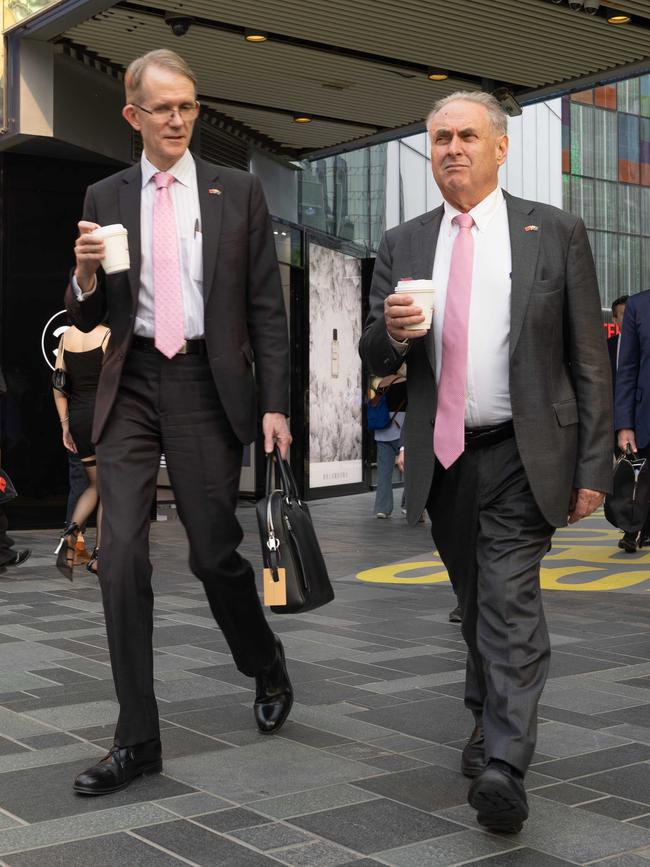‘Job not done’: Don Farrell flies out to seal end of lobster, beef bans amid AUKUS concerns
Trade Minister Don Farrell will press his Chinese counterpart to remove the remnants of Beijing’s $20bn trade coercion campaign as China’s state media fulminates over Australia’s ‘increasingly aggressive’ AUKUS posture.

Trade Minister Don Farrell has set off for Shanghai to press his Chinese counterpart to remove the remnants of Beijing’s $20bn trade coercion campaign as China’s state media fulminates over Australia’s “increasingly aggressive” AUKUS posture.
Late on Sunday, Senator Farrell was set to meet with China’s Commerce Minister Wang Wentao in Shanghai.
The two-day trip closely follows a visit to Beijing late last week by some of corporate Australia’s most senior figures, who met with Chinese leaders in the Great Hall of the People.
People familiar with the Trade Minister’s agenda said his top priorities were to get assurances that China would honour its deal to allow the resumption of Australia’s live lobster trade by the end of the year and to secure an end of bans on a clutch of Australian beef abattoirs.
“We can’t rest on our laurels. The job is not done,” Senator Farrell said before flying from Australia early on Sunday.

“I will continue to press for the full resumption of normal bilateral trade,” he said.
The visit continues the Albanese government’s increasingly regular contact with Chinese leaders and ministers and follows a visit by Jim Chalmers to Beijing in late September.
Senator Farrell’s visit comes as Chinese state media again warned Australia about the consequence of its AUKUS defence co-operation pact after the Albanese government last week announced a new plan to build a missile manufacturing hub.
China’s most authoritative English language newspaper, the China Daily, said Australia’s missile and nuclear-powered submarine acquisitions were “beyond the country’s defensive needs”.
“This has called into question the purpose of AUKUS and Australia’s role in the grouping, which is displaying an increasingly aggressive character,” the China Daily editorialised.
The party-state masthead warned that Canberra was “continuing to wade into dangerous waters”.
Tension between Australia’s huge trade relationship with China and Canberra’s concerns about Beijing’s assertive behaviour in the Indo-Pacific have continued during the Albanese government’s first term.
In September, China’s People’s Liberal Army blasted a missile over the Pacific for the first time in more than forty years hours before Dr Chalmers arrived in Beijing.
Senator Farrell’s portfolio has made him one of the most upbeat federal ministers on relations with China.
On his watch, Australia’s exports to China reached a fresh peak in 2023 of $203bn as Beijing allowed the resumption of previously blocked goods, including coal, barley and timber.
On Monday, the Trade Minister will lead Australia’s delegation at the China International Import Expo, the world’s largest import trade show.
More than 260 Australian companies will exhibit at the trade show, a record turnout.
Businesses from New South Wales, Queensland, West Australia, Tasmania, the Northern Territory and the ACT will be housed in the “Australian pavilion”.
However, continuing a legacy of Dan Andrews’ Labour government, Victorian business will instead showcase in a separate “Victoria pavilion”.
Over the weekend, Foreign Minister Penny Wong appointed former West Australian Premier Mark McGowan to the board of the National Foundation for Australia-China Relations to decidedly mixed reviews.
Along with Mr Andrews, Mr McGowan was one of the most prominent critics of the Morrison government as Australia’s relationship with China imploded in 2020.
Late last week, the Australia China Business Council led a high-level corporate delegation to Beijing for meetings with Chinese leadership figures, including Commerce Minister Wang Wentao, Chinese vice premier He Lifeng and deputy chairman of the China Council for the Promotion of International Trade Zhang Shougang.
The corporate delegation included Rio Tinto CEO Jakob Strausholm, BHP executive Geraldine Slattery, Fortescue CEO Dino Otranto, Cochlear CEO Dig Hewitt, King & Wood Mallesons chief executive partner Renae Lattey and ANZ’s China country head Thomas Horn.
“Our discussions with Chinese leaders reaffirm the importance of maintaining strong economic ties between our two countries,” said Australia China Business Council president David Olsson.
“While Australian companies are building diversified supply chains to strengthen resilience, China remains a vital partner in our economic future,” he said.




To join the conversation, please log in. Don't have an account? Register
Join the conversation, you are commenting as Logout